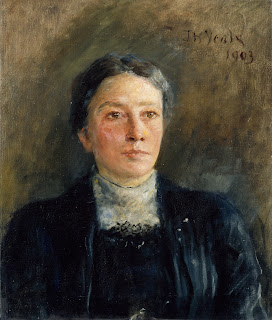Patriotic Echoes: Unveiling Ireland's Spirit in Lady Augusta Gregory's "The Rising of the Moon"
Authentic Irish Voices: Gregory's Realism
 |
| Portrait of Lady Gregory, 1903 |
THE RISING OF THE MOON is a beautiful one-act little play, written in 1904 by Lady Augusta Gregory who is best known for irish theme and lifelike characterization. In fact, Her characters who are specialized in realistic depictions of their native land are not at all romanticized, but are very realistic--one of her great talents was being able to catch the vocabulary, speech mannerisms and rhythms of the Irish people, which she studied as she traveled throughout Ireland, seeking its rich oral tradition. In THE RISING OF THE MOON, one sees the deep conflict between the hearts of the Irish people, even those hired as policemen (who also longed secretly, in their heart of hearts, for freedom, as often as not), and their duty to maintain the status quo, with all the English gold and power and "good common sense" behind it.
The play opens with three Irish policemen, obviously working for the British authorities, who are on a man hunt for an escaped political prisoner. The policemen discuss the large reward money they will receive for the criminal’s capture and as two of the policemen go off, the Sergeant stays to guard the harbor where he thinks a ship is bound to take the rebel to freedom.
The Sergeant then meets a poor peasant man who passes the time singing songs of Ireland. The singer engages the Sergeant in conversation which drifts towards the past. The Sergeant begins to think of the fate of the fugitive in comparison to his own. He thinks about the friends of his youth, and the circumstances which could have placed him in the position of hiding from the police in the dark.
The Sergeant undergoes a change of heart with the disguised rebel begins to sing the song of the Fenian Movement, composed around 1865, of The Rising of the Moon. So moved is the sergeant by memories of his own patriotic youth that he allows the criminal to escape and gives up his chance of the reward and his duty towards the British government.
This play shows mistaken identity through disguise; in this case a wig and a hat. The Sergeant does not recognize his quarry because of Walsh’s costume. Also, the wearing of the disguise enables Walsh to get close to his enemy so that the Sergeant can unveil his own identity with the removal of Walsh’s wig. Eventually, when the Sergeant discovers that Walsh is indeed the criminal he has been seeking, he performs his complicity with the nationalist movement by hiding Walsh’s wig and hat from the other policeman. After the policemen leave, the Sergeant again performs his own collusion by giving Walsh back his disguise so the rebel can continue to delude others. In this way, the disguise performs the entire journey towards the discovery of the Sergeant’s “true” identity underneath his mask of law and duty; the use and exchange of the disguise are similar to the exchanges of identity between the Irish man representing British rule and the Irish man representing the rebellion.
Ardhendu De
References
Spreading the news, [and] The rising of the moon : Gregory, Lady, 1852-1932 : Free Download, Borrow, and Streaming : Internet Archive. (n.d.). Internet Archive. https://archive.org/details/spreadingnewsand00greguoft


Comments
Post a Comment
Drop any query, suggestion or comment here.